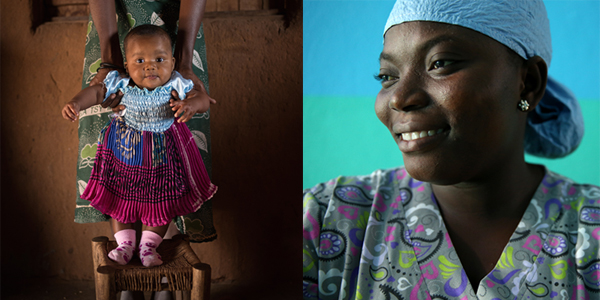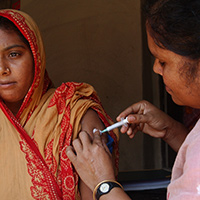APC's Sustaining Health Facility Improvements (SHFI) program in Sierra Leone aims to engage communities, health service providers, and district authorities in building better systems, structures, and processes for conducting maintenance and preventive maintenance of health facilities by mobilizing community and government resources to fund it. This booklet provides stories of the work the FMCs and their communities have done, as they devote their time, resources, and energy to maintaining and improving their community PHUs.
Resources

Updated Community Health Systems (CHS) Catalog »
The CHS Catalog draws from policies and related documentation across 25 countries with specific attention to family planning. It is intended for policymakers, program managers, researchers, and donors interested in learning more about the current state of community health systems.

Dashboard on Youth Sexual & Reproductive Health »
The tool provides views of indicators related to the sexual & reproductive health of people ages 10 to 24 years in select countries in Asia and the Middle East.

Develop an Injectable Contraceptives Strategy »
Use this resource to craft a strategy for building support for community-based access to injectables (CBA2I) among key decision makers in country.
Search for a Resource
Effective and sustainable health interventions are coordinated, multifaceted, and multisectoral, and leverage the resources and expertise of the public, faith-based, and private health sectors. This is especially the case with family planning activities, for which partnerships across health and non-health sectors have great potential to create demand for and improve delivery of family planning services.
APC in Uganda aims to ensure that all Ugandans have access to high-quality, voluntary family planning services. Over the last five years, APC Uganda’s activities have increasingly focused on improving the capacity of Ugandan religious leaders to convey family planning information to their congregations—including youth—and communities while ensuring that faith-based health facilities are equipped with family planning products and knowledgeable staff.
Community-based family planning (CBFP) is a high-impact practice for extending reproductive services to women, especially those who live in hard-to-reach places. Condoms, oral contraceptive pills, injectable contraceptives, and even self-injection are provided by community health workers through family planning programs. Yet many of these programs do not include emergency contraceptive pills. APC grantee WellShare International started researching why a method with no medical contraindications was excluded from the CBFP method mix in Uganda.
In Madagascar, through APC and the USAID Community Capacity for Health (Mahefa Miaraka) programs, work was done in several communities to showcase population, health, and environment methods and practices. This short film takes you to the village of Ambilo located near the forest corridor of Fandriana Vondrozo, along the southeastern part of the island.
Learn more about APC's HMIS Scale-Up Project that supported the FMOH’s ongoing commitment to improving health through the Health Sector Transformation Plan’s Information Revolution agenda and was conducted in close collaboration with the FMOH, RHBs, ZHDs, WorHOs, and health facilities.
Since 2014, through a grant by the USAID-funded APC project, World Vision Kenya has led the Healthy Timing and Spacing of Pregnancies project in Garba Tulla in northern Kenya, home to about 50,000 people.
Learn more about the work being done through the APC grantee, IMC, in Ninewa Plains, Iraq. IMC’s program operates in six primary health care centers and one secondary facility in places where minorities and other conflict-affected communities have limited access to essential services.
Northern Iraq only recently emerged from war, and security challenges and the effects of trauma and displacement persist. To support a resilient and self-reliant approach to improving access to health services, the APC project is managing a grant with IMC that helps to link the development and humanitarian continuum in the Ninewa Plains with a target population of approximately 64,000 residents.
Read the journal article in Global Health: Science and Practice journal by APC/Benin staff about community health workers and facility-based health care providers who were trained to administer DMPA-SC safely and effectively in 10 health zones.
- ‹ previous
- 3 of 27
- next ›
